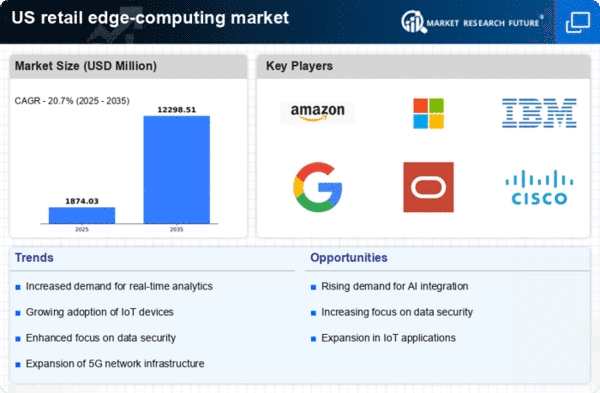Demand for Real-Time Analytics
The retail edge-computing market is experiencing a surge in demand for real-time analytics, driven by the need for immediate insights into consumer behavior and inventory management. Retailers are increasingly leveraging edge computing to process data closer to the source, enabling faster decision-making. According to recent estimates, the market for real-time analytics in retail is projected to grow at a CAGR of approximately 25% over the next five years. This shift allows retailers to optimize operations, enhance customer experiences, and respond swiftly to market changes. As a result, the retail edge-computing market is becoming a critical component in the strategic toolkit of retailers aiming to maintain a competitive edge in a rapidly evolving landscape.
Growth of Omnichannel Retailing
The rise of omnichannel retailing is significantly influencing the retail edge-computing market. Retailers are increasingly adopting a seamless shopping experience across various channels, including online, mobile, and in-store. This trend necessitates the deployment of edge computing solutions to manage and analyze data from multiple sources in real-time. It is estimated that by 2026, omnichannel sales in the retail sector could account for over 60% of total retail sales in the US. Consequently, the retail edge-computing market is positioned to benefit from this growth, as it enables retailers to deliver personalized experiences and maintain inventory accuracy across all platforms.
Enhancement of Customer Experience
Enhancing customer experience remains a pivotal driver for the retail edge-computing market. Retailers are increasingly utilizing edge computing to deliver personalized services, such as targeted promotions and tailored recommendations, based on real-time data analysis. This approach not only improves customer satisfaction but also drives sales. Research indicates that businesses that prioritize customer experience can see revenue growth of up to 10% annually. As retailers strive to create more engaging shopping environments, the retail edge-computing market is likely to expand, providing the necessary infrastructure to support these initiatives.
Regulatory Compliance and Data Governance
Regulatory compliance and data governance are becoming increasingly important in the retail edge-computing market. With the rise of data privacy regulations, such as the California Consumer Privacy Act (CCPA), retailers must ensure that their data handling practices meet legal requirements. This has led to a growing demand for edge computing solutions that can facilitate secure data processing and storage. It is anticipated that compliance-related investments in technology will increase by approximately 15% over the next few years. As retailers navigate these regulatory landscapes, the retail edge-computing market is likely to play a crucial role in ensuring compliance while maintaining operational efficiency.
Cost Efficiency and Operational Optimization
Cost efficiency and operational optimization are critical factors propelling the retail edge-computing market. By processing data at the edge, retailers can reduce latency and bandwidth costs associated with sending large volumes of data to centralized cloud servers. This localized processing can lead to operational savings of up to 30% in some cases. Furthermore, edge computing allows for better resource allocation and inventory management, which can enhance overall profitability. As retailers seek to streamline operations and reduce costs, the retail edge-computing market is expected to see increased investment and adoption.
















